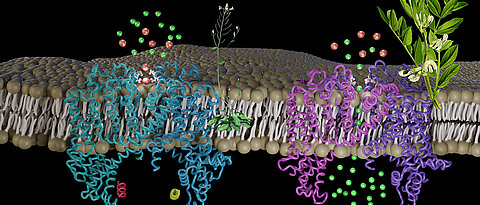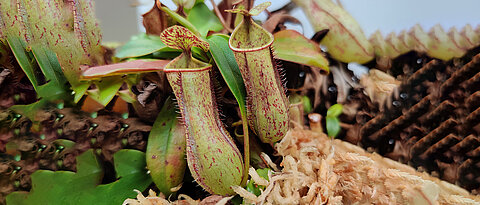
Plants in which an ion channel of the vacuole is hyperactive are extremely stressed and grow poorly. But the broad bean is an exception, as Würzburg researchers have discovered.
more
Plants in which an ion channel of the vacuole is hyperactive are extremely stressed and grow poorly. But the broad bean is an exception, as Würzburg researchers have discovered.
more
A new study by Würzburg botanist Kenji Fukushima shows the role of subgenome dominance for plants in the evolutionary development of special traits, such as a carnivorous lifestyle.
more
Their work is most frequently cited in publications of other scientists. Researchers from the University of Würzburg are therefore included in the Highly Cited Researchers 2023 list.
more
MYC proteins play an important role in many types of cancer. A research team at the University of Würzburg has now succeeded in indirectly influencing these proteins - with clear consequences for the tumor.
more
Animal sounds are a very good indicator of biodiversity in tropical reforestation areas. Researchers led by Würzburg Professor Jörg Müller demonstrate this by using sound recordings and AI models.
more
Combinations of unfavourable weather conditions over several years can cause a decline in insect biomass. This is shown by a study published in "Nature" by a team led by Professor Jörg Müller.
moreOn July 26, 2023, Katalin Karikó was awarded the Theodor Boveri Prize by the Würzburg Physical-Medical Society. Those who could not experience her inspiring lecture in person at the Biocenter can watch the recording here.
more
How can the cultivation of cacao be improved by using the right pollination technique? This has now been investigated by a research team including Ingolf Steffan-Dewenter's Department of Animal Ecology and Tropical Biology.
more
In the fruit fly Drosophila, circadian clocks also control fat metabolism. This is shown in a new study by a research team at the University of Würzburg. The findings could also be relevant for humans.
more
In the form of DNA, nature shows how data can be stored in a space-saving and long-term manner. Würzburg's chair of bioinformatics is developing DNA chips for computer technology.
more
The sensory hairs of the Venus flytrap contain a heat sensor that warns the plant of bush fires. It reacts to rapid temperature jumps, as Würzburg researchers have discovered.
more
With her research, biochemist Katalin Karikó has laid the foundation for the development of RNA vaccines against the coronavirus. Now she is coming to the University of Würzburg to give a public lecture.
more
How do leafcutter ants measure the size of the leaf pieces they cut off? A study by the University of Würzburg now provides answers.
more
How do solitary bees and wasps recognize their homes? Biologists Dr. Sylvie Vandenabeele and Professor Thomas Schmitt investigated this question. They were able to demonstrate the importance of olfactory markers.
more
Great recognition for translational cancer researcher Dr. Markus Diefenbacher: He was nominated as Associated Editor of the journal Oncogene.
more